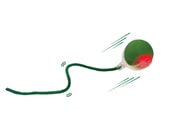Eye-opening warning: Foundation advocates less booze to prevent this disease!
- Replies 2
Disclaimer: The information provided in this article does not constitute medical advice. We suggest consulting healthcare professionals before following any recommendations.
As people gather around the dinner table or unwind after a long day, many enjoy the ritual of sipping a glass of wine or cracking open a cold beer.
It's a part of the culture, a moment of relaxation, and for some, a culinary delight.
However, the Macular Disease Foundation Australia (MDFA) is urging Australians to reconsider their daily drinking habits with a dire warning.
The beloved Aussie tradition of enjoying a couple of beers after work or a half-bottle of wine at dinner might be more harmful than you realise.
According to the MDFA, consuming more than 12 grams of alcohol a day, which equates to less than one large glass of wine or a large beer, is linked to a heightened risk of age-related macular degeneration (AMD).
This condition is the leading cause of irreversible vision loss among the elderly, and it currently affects more than 1.5 million Australians.

The foundation's systematic review of alcohol consumption, dietary patterns, and nutritional supplements connected to AMD revealed some concerning findings.
It turns out that even a second beer or glass of wine could have a 'detrimental effect' on your eyes, potentially increasing the likelihood of developing this debilitating disease.
Excessive alcohol intake is known to contribute to oxidative stress and inflammation in the body, which are key factors that can accelerate the development and progression of AMD.
Dr Kathy Chapman, the Chief Executive of the MDFA, advocated for a reduction in alcohol consumption.
‘We know that cutting back on alcohol has many benefits, including reducing the risk of developing liver disease, high blood pressure, certain cancers, as well as positive effects like boosting mood, keeping a healthy weight and saving money,’ she said.
‘But what our review is telling us—and what many people don’t realise—are the significant benefits drinking less alcohol has on maintaining healthy eyes and lowering the risk of developing or progressing AMD.’
The MDFA did not just stop at alcohol reduction; they also promoted a 'Mediterranean diet' as a cornerstone for overall health and particularly eye health.
This diet is rich in vegetables, fruits, whole grains, legumes, nuts, seeds, fish, and seafood, with a generous use of extra virgin olive oil and a variety of herbs and spices.
Thanks to its antioxidant and anti-inflammatory properties, this diet has been linked to lower levels of oxidative stress biomarkers in the blood.
For those who enjoy snacking, the Mediterranean diet offers healthier alternatives like natural Greek-style yogurt, fresh vegetable sticks with hummus or tzatziki, crusty bread dipped in olive oil or pesto, or a simple piece of fruit.
‘Inflammation plays a role in the development of AMD, as ocular tissues are vulnerable to oxidative stress,’ Dr Chapman explained.
‘Adhering to a Mediterranean diet has been linked to lower levels of oxidative stress biomarkers in the blood.’
‘This may be due to the antioxidant and anti-inflammatory properties found in vegetables, fruit and fish, whereas research consistently suggests a Western diet is linked with higher inflammation in the body, which may explain why a Western diet was possibly associated with increased risk of developing AMD,’ she added.
The foundation also suggested reducing the intake of high-meat diets, especially red and processed meats.
As we become increasingly aware of the impact of our dietary choices on our health, recent studies shed light on the risks associated with certain food and drink habits.
The Macular Disease Foundation's warning against excessive alcohol consumption joined a growing body of research linking diet to health issues.
In a related study, researchers uncovered a concerning correlation between diet soft drink consumption and the risk of heart disease, further emphasising the importance of making informed choices about what we consume.
 Have you made any dietary changes that have positively impacted your health? Do you have tips for reducing alcohol consumption? Share your experiences and advice in the comments below.
Have you made any dietary changes that have positively impacted your health? Do you have tips for reducing alcohol consumption? Share your experiences and advice in the comments below.
As people gather around the dinner table or unwind after a long day, many enjoy the ritual of sipping a glass of wine or cracking open a cold beer.
It's a part of the culture, a moment of relaxation, and for some, a culinary delight.
However, the Macular Disease Foundation Australia (MDFA) is urging Australians to reconsider their daily drinking habits with a dire warning.
The beloved Aussie tradition of enjoying a couple of beers after work or a half-bottle of wine at dinner might be more harmful than you realise.
According to the MDFA, consuming more than 12 grams of alcohol a day, which equates to less than one large glass of wine or a large beer, is linked to a heightened risk of age-related macular degeneration (AMD).
This condition is the leading cause of irreversible vision loss among the elderly, and it currently affects more than 1.5 million Australians.

The MDFA cautioned that having over one standard drink daily raises the risk of age-related macular degeneration (AMD). Credits: Shutterstock
The foundation's systematic review of alcohol consumption, dietary patterns, and nutritional supplements connected to AMD revealed some concerning findings.
It turns out that even a second beer or glass of wine could have a 'detrimental effect' on your eyes, potentially increasing the likelihood of developing this debilitating disease.
Excessive alcohol intake is known to contribute to oxidative stress and inflammation in the body, which are key factors that can accelerate the development and progression of AMD.
Dr Kathy Chapman, the Chief Executive of the MDFA, advocated for a reduction in alcohol consumption.
‘We know that cutting back on alcohol has many benefits, including reducing the risk of developing liver disease, high blood pressure, certain cancers, as well as positive effects like boosting mood, keeping a healthy weight and saving money,’ she said.
‘But what our review is telling us—and what many people don’t realise—are the significant benefits drinking less alcohol has on maintaining healthy eyes and lowering the risk of developing or progressing AMD.’
The MDFA did not just stop at alcohol reduction; they also promoted a 'Mediterranean diet' as a cornerstone for overall health and particularly eye health.
This diet is rich in vegetables, fruits, whole grains, legumes, nuts, seeds, fish, and seafood, with a generous use of extra virgin olive oil and a variety of herbs and spices.
Thanks to its antioxidant and anti-inflammatory properties, this diet has been linked to lower levels of oxidative stress biomarkers in the blood.
For those who enjoy snacking, the Mediterranean diet offers healthier alternatives like natural Greek-style yogurt, fresh vegetable sticks with hummus or tzatziki, crusty bread dipped in olive oil or pesto, or a simple piece of fruit.
‘Inflammation plays a role in the development of AMD, as ocular tissues are vulnerable to oxidative stress,’ Dr Chapman explained.
‘Adhering to a Mediterranean diet has been linked to lower levels of oxidative stress biomarkers in the blood.’
‘This may be due to the antioxidant and anti-inflammatory properties found in vegetables, fruit and fish, whereas research consistently suggests a Western diet is linked with higher inflammation in the body, which may explain why a Western diet was possibly associated with increased risk of developing AMD,’ she added.
The foundation also suggested reducing the intake of high-meat diets, especially red and processed meats.
As we become increasingly aware of the impact of our dietary choices on our health, recent studies shed light on the risks associated with certain food and drink habits.
The Macular Disease Foundation's warning against excessive alcohol consumption joined a growing body of research linking diet to health issues.
In a related study, researchers uncovered a concerning correlation between diet soft drink consumption and the risk of heart disease, further emphasising the importance of making informed choices about what we consume.
Key Takeaways
- The Macular Disease Foundation warned that consuming more than one standard drink per day increases the risk of age-related macular degeneration (AMD).
- Excessive alcohol consumption is believed to contribute to oxidative stress and inflammation, which could accelerate the development and progression of AMD.
- The foundation recommended adhering to a Mediterranean diet and reducing alcohol intake to maintain healthy eyes and lower the risk of AMD.
- A Western diet, particularly high in red and processed meats, had been associated with higher inflammation and possibly an increased risk of developing AMD.







